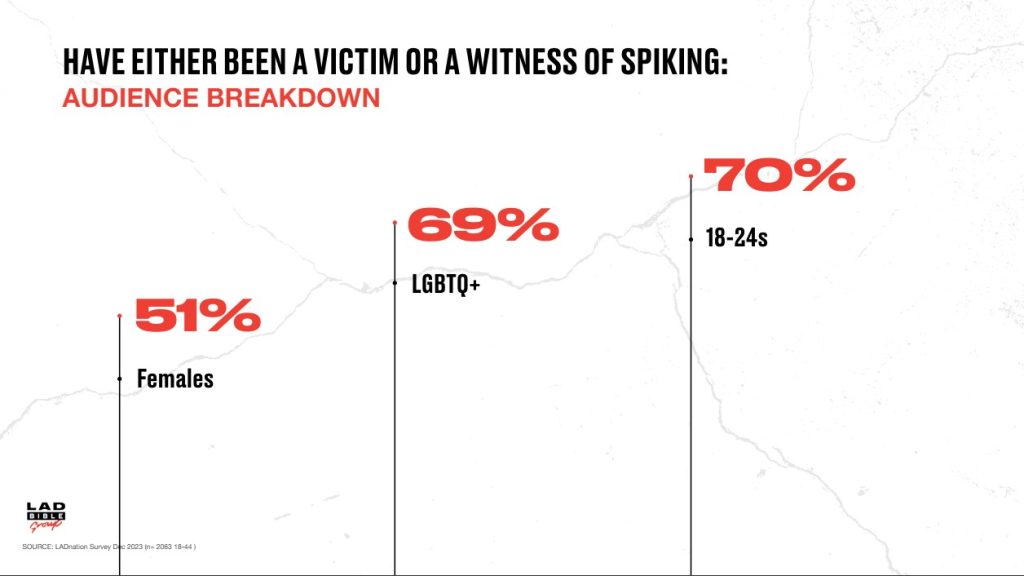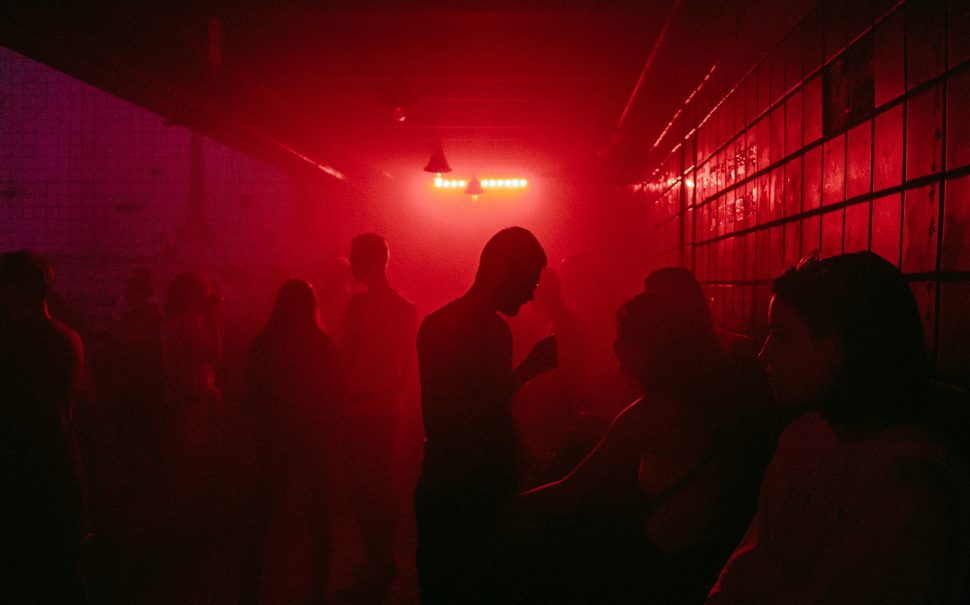Anna, 25, was enjoying a couple of drinks with a friend in Liverpool when her night was turned upside down.
She arrived at a local nightclub to meet with a group of young men she knew through a mutual friend, only to find they had paid for several bottles of prosecco for the group to enjoy.
But what they didn’t tell Anna*, was that the prosecco had been spiked.
“I can’t really remember much of the night, I just remember getting to our table and there were bottles of prosecco that had already been opened,” said Anna.
“I didn’t drink anything other than a few glasses and I remember thinking ‘this is hitting me much more than it usually does’ and that my head was spinning.”
Spiking is when someone puts drugs or excess alcohol into someone’s drink or body without their knowledge or consent, often to make it easier to rape or sexually assault them.
Spiking, in some form, became illegal in 1861, but this law has been heavily criticised as outdated, leaving a high burden of proof which means victims rarely receive justice.
This leads many to choose not to even report the crime.
“One of the lads from the group we met up with then came back with me. I don’t remember asking him to come back, I don’t remember getting in the taxi, all I remember is him having to carry me into my flat and him holding my hair back as I vomited into the toilet,” Anna added.
“I don’t even know if I slept with him. I just know the next day I woke up and there was a boy in my bed who said he needed to go.
“Later, my friends sent me photos from the night, and I asked them ‘oh when did we take these?’ and they told me it was 20 minutes after arriving at the club, but I couldn’t remember.”
Symptoms of spiking typically start within 15 minutes of the crime taking place and it may take up to 12 hours for them to subside.
Once the symptoms wear off, it may take victim’s bodies days or even weeks to fully get over what happened to them.
“It took me days to recover. I was vomiting up water and I didn’t eat for two days. I felt really icky, really sweaty and disgusting,” said Anna.
“I cannot count how many times I vomited, and I just couldn’t stop shaking.
“I don’t speak to boys at night now. I get really uncomfortable around large groups of boys, even If I know I can’t deal with large groups.”
A recent campaign from LADbible group found a shocking seven in ten people aged 18-24 have been affected by drink spiking.
Furthermore, 87% of them didn’t report it to the police, with 82% saying they would be more likely to report incidents to the police if spiking were to be made explicitly illegal.

Hannah Jones, 23, is a data analyst who has spent significant time researching spiking and women’s safety as part of her degree and her career.
She explains that, while damning, this statistic isn’t shocking and is largely due to a culture of ‘victim blaming’ which surrounds cases of spiking and sexual harassment.
Jones said: “Victim blaming shifts the responsibility of sexual harassment onto the victim and fails to hold perpetrators accountable.
“People choose to blame victims because it creates control and makes it easier to understand uncomfortable situations.
“An example of this is ‘slut-shaming’ where an assault is blamed on the victim wearing revealing clothing or being sexually promiscuous, giving men ‘permission’ to be sexually forward with them.”
LADbible group’s research was conducted through their consumer youth panel which consists of more than 55,000 Gen Z’s and Millennials – people born between 1981 and 2012.
Their campaign, titled ‘End Spiking, Now’, advocates speaking out against spiking incidents, through educating young people online and sharing the stories of victims through the series ‘Survivors of Spiking: Our Stories.’
The government calls it an 'insidious and predatory act' and offenders face up to 10 years in prison. But drink spiking is still an issue in Britain.
— Good Morning Britain (@GMB) April 4, 2024
A report by the Ladbible Group and Stamp Out Spiking suggests that 7 in 10 young people have either experienced it or witnessed… pic.twitter.com/l6X2vPtDeD
To achieve this they partnered with Stamp Out Spiking, a charity which seeks to raise further awareness for the crime and strengthen the law surrounding it to make it clear that spiking is a criminal offence.
The charity was founded by Dawn Dines in 2019 and became a registered charity in May last year.
Dines said: “I’ve been on a mission for the past 20 years to campaign and educate to safeguard on all spiking-related issues.
“I’ve been instrumental to getting the law put into parliament to try to get the antiquated legislation updated to make sure that spiking is a recognised criminal offence and I have gotten an international day recognised on the 15th of July.”
In recent months, the UK government have finally started implementing changes to the 1861 law, making it clearer that spiking is an illegal offence.
Dines added: “It’s the most disgusting invisible crime that’s been going happening on our streets undetected for years.
“We keep talking about it being spiking, but it’s actually poisoning, that’s what people are doing to each other they’re poisoning people.”
.@SharonNJGaffka sat down with us to share her terrifying experience of being spiked, whilst out at a restaurant with friends 😳
— LADbible (@ladbible) April 4, 2024
Spiking is a malicious act that can happen to anyone, anywhere ✋
If you or someone you know has been affected by drink spiking, please contact… pic.twitter.com/EOj1YitGZ3
Dines thanked LADbible and Sacha Lord, co-creator of The Warehouse Project and Night Time Economy Adviser for Greater Manchester, as she praised the End Spiking, Now campaign for its success in raising the profile of the crime and the need to have it recognised more in law.
She said: “Sacha has been amazing in helping us along the way and giving us support and in Manchester we’ve had lots of reports of spiking, so it was so good that LADBible combined forces with us.
“We’ve had more than 10 million hits across all our social media sites for the campaign so the awareness that has been raised is just phenomenal. I cannot thank LADBible enough.”
As part of the campaign, LADBible and Stamp Out Spiking took over the Manchester Screen, the second-largest digital billboard in Europe.

Situated just half a mile away from Old Trafford, the billboard is seen by 415,000 people every week.
But with events where drinking alcohol will be commonplace taking place over the summer, such as Glastonbury or EUROS 2024, Jones worries cases of spiking may rise despite the recent increase in awareness.
She said: “Naturally, with summer comes more drinking and events, leading to an increase in drink spiking. Unfortunately, this is not surprising. Specifically with the Euros, football can attract a toxic masculine crowd that encourages men to be even more intrusive towards women.
“As someone who enjoys watching football, carefully choosing a pub and practising my best lines to deter unwanted attention is something I am already thinking about to ensure that I can still get enjoyment out of the tournament.”
Dines also said people should be wary of their friends who may think that slipping something into your drink as a joke or to try and get them to have a better time.
She added: “Spiking with alcohol is still the most common form of spiking and it’s normally done by people who love you, how bizarre.
“So, it’s not always people with malicious intent but it still needs to be made clear that putting anything into anybody’s body without their consent is illegal.”
Typical signs of a drink which has been spiked are excess bubbles, sediment in the drink or ice that sinks.
If you’ve been spiked, you will start to feel drunk very quickly and may experience blurred vision, vomiting and loss of consciousness.
But Jones believes advice like this is simply not enough.
She said: “I am sick of being told to watch my drink, wait longer at the bar as they find an anti-spiking lid, asking friends to watch my drink as I nip to the loo, the problem here is male violence not female vigilance.
“Rhetoric should be changed in prioritising female safety instead of encouraging change to female behaviours.
“Initiatives such as Ask for Angela and #Girlsnightin are examples of this, women are inconvenienced instead of questioning the real reasoning behind this fear, male behaviours.”
If you believe you may have been spiked, you should get to a trusted friend or a member of staff, tell them you’ve been spiked and ensure they do not let you out of their sight.
For more information about spiking and the ‘Stop spiking now’ campaign, visit the Stamp Out Spiking website.
*Name changed to protect the identity of the source.
Feature Image: Aleksandr Popov on Unsplash




